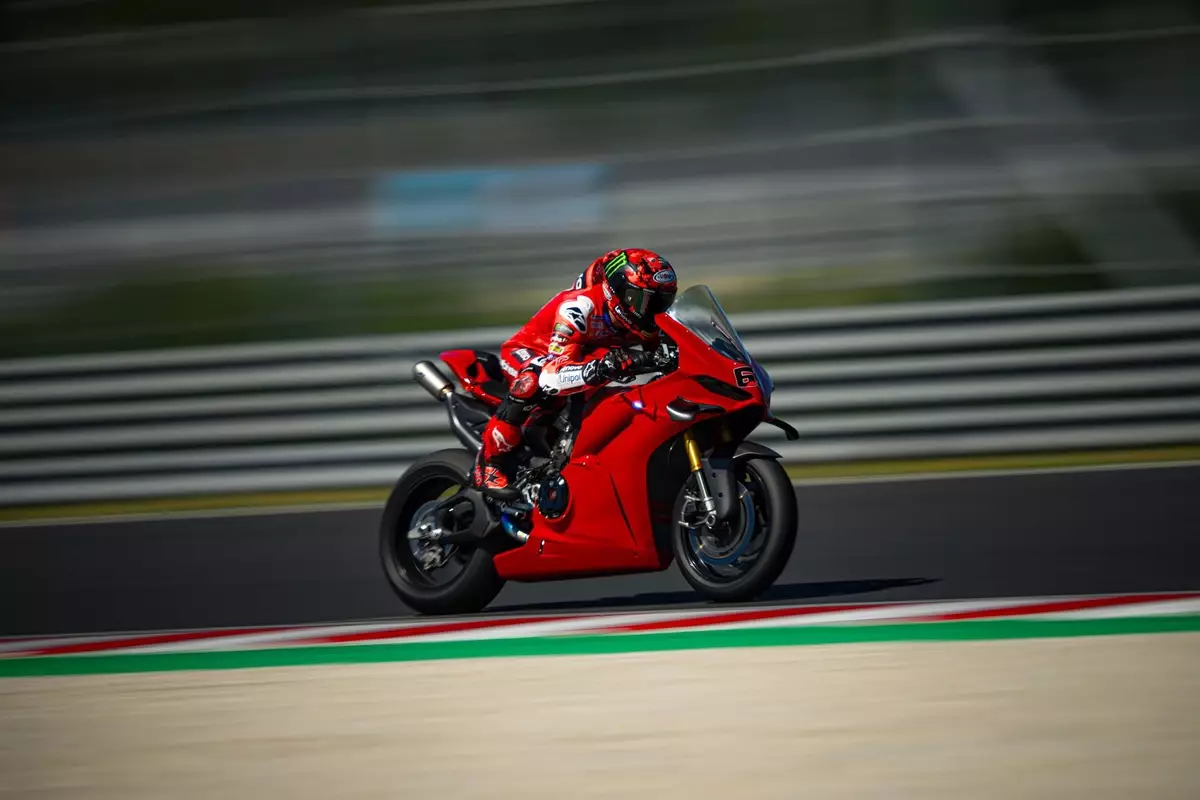In the fiercely competitive landscape of MotoGP, where milliseconds determine the champions, Ducati’s recent actions underscore a relentless pursuit of excellence. Sending seven R&D and elite riders to Hungary for a private testing session at the newly introduced Balaton Park circuit reflects an astute strategy: control the unknown before it becomes a wildcard in the championship race. Unlike typical pre-race preparations, this move is not just about familiarization; it’s a calculated effort to gain a tangible advantage. Ducati’s decision exemplifies a mindset that values data-driven preparation, meticulous testing, and a proactive approach—traits that distinguish champions from contenders.
This private session at Balaton allowed Ducati to replicate track conditions and experiment with modifications even before the circuit graces the MotoGP calendar. It is more than just testing; it’s an assertion of dominance, signaling to rivals that Ducati isn’t leaving anything to chance. In a sport motivated by innovation and precision engineering, this strategic step emphasizes the importance of understanding every nuance of an unfamiliar track—curves, braking points, and the subtle shifts in grip—and tailoring their machinery accordingly.
Technological Precision and the Power of Preparation
What makes Ducati’s approach remarkable isn’t merely the act of testing but how they elevate it through technological finesse. Providing each rider with the advanced Panigale V4 S Pro, a model derived from their WorldSBK champion bike, signifies a nuanced transfer of technology from the street to the track. Beyond the nominal capabilities, Ducati’s engineers implemented targeted upgrades—improving brakes, suspension, and chassis responses within the boundaries set by regulations—to simulate race conditions as closely as possible.
This deliberate experimentation isn’t just about pushing hardware to its limits; it’s about refining the mental and physical adaptability of their riders. Both Pecco Bagnaia and Marc Marquez—leaders with distinct riding styles—approached the test with a shared goal: understanding the circuit’s idiosyncrasies to optimize performance on race day. Bagnaia’s candid enthusiasm reveals a rider’s mindset that marries curiosity with professionalism; he’s not just riding, but actively probing the bike’s limits to build a mental map of the track.
Meanwhile, Marquez’s positive reflections highlight an often overlooked aspect of motorcycle racing: the importance of rider confidence. When a champion like him finds the layout “unique and unusual,” it is a testament to Ducati’s thorough preparation. This confidence, rooted in data and experience, creates a psychological edge that can be the difference-maker in a high-stakes race.
The Significance of the Balaton Circuit’s Return after 33 Years
The resurfacing of the Hungarian GP after a three-decade hiatus isn’t just a geographic or scheduling change; it’s a strategic pivot. Historically, a race’s history, track layout, and local conditions influence team and rider readiness, but Ducati’s proactive testing ensures they’re ahead of the curve. The last Hungarian GP in 1992 marked an era long gone, where Eddie Lawson and Mick Doohan etched their victories—moments frozen in time, now serving as historical footnotes to a present driven by innovation.
This transition also underscores how Ducati perceives this event: not merely as another race but as a critical battleground to secure extra points and assert their technological and tactical superiority. Their preemptive approach, testing at a comparable circuit, equips their riders with the muscle memory and a deeper understanding that could be pivotal amid unpredictable race dynamics.
Riding the Edge of Tradition and Innovation
Ducati’s attitude towards this testing camp reflects a daring blend of respect for tradition and aggressive innovation. While the sport is steeped in history and heritage, the Italian manufacturer recognizes that staying ahead involves continuous technological evolution. By transforming street bikes into near-race machines for testing, Ducati expands the horizon of what’s possible—pushing the envelope while respecting the rules that govern private testing.
This approach demonstrates a broader philosophy: racing is as much about engineering ingenuity as it is about rider talent. The ability to adapt, to fine-tune the bike in response to track demands, and to do so ahead of competitors gives Ducati a competitive edge that can translate directly into race success. The fact that Marquez and Bagnaia, two of the most talented riders in the sport, expressed positivity after just a few hours on the track confirms the value of this careful, calculated preparation.
The Psychological Impact of Strategic Testing
Beyond the physical and technical benefits, Ducati’s secret weapon may be the psychological advantage this testing provides. Confidence in the machine, familiarity with the track, and the knowledge that their team has already explored every corner and possibility cultivate a winning mindset. Riders like Bagnaia and Marquez are known for their mental toughness, and this kind of preparatory work subtly reinforces their belief that they are ready to seize opportunities when the lights go out.
Moreover, this proactive stance sends a powerful message to rivals: Ducati isn’t merely reactive but is shaping the narrative of the championship, controlling variables before they escalate into chaos. In a sport where momentum and psychological resilience often tilt the balance, Ducati’s measured and strategic approach could prove decisive in the coming races.
—
In essence, Ducati’s decision to undertake an extensive private test at Balaton Lake is a masterstroke that exemplifies modern racing’s fusion of engineering, psychology, and strategic foresight. It reflects a manufacturer committed not just to competing but to redefining what it means to lead in the world of MotoGP. As the Hungarian GP looms closer, one thing remains clear: Ducati’s relentless pursuit of innovation positions them not merely as competitors but as formidable architects of their own destiny.

